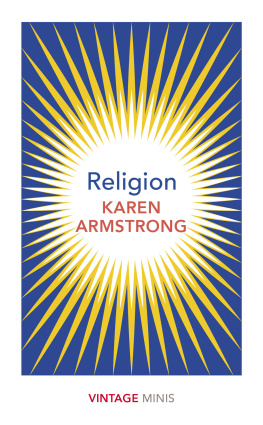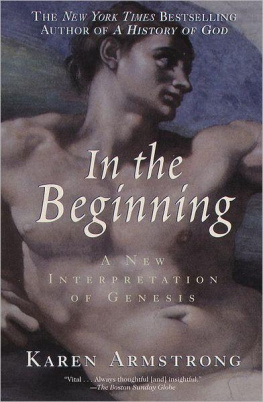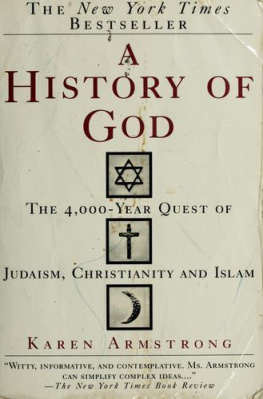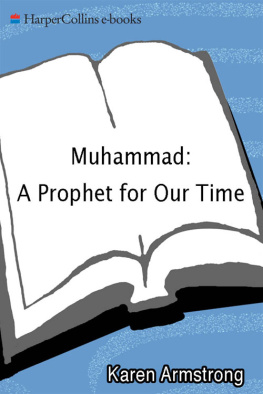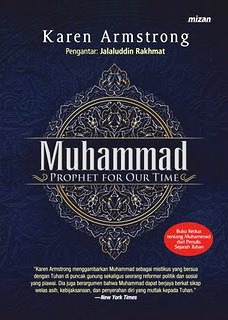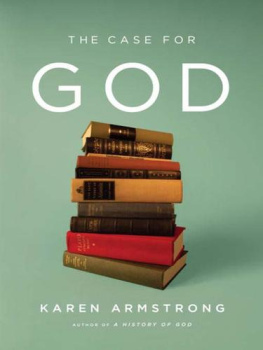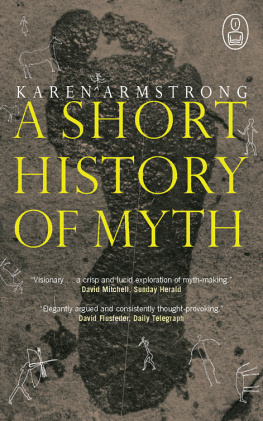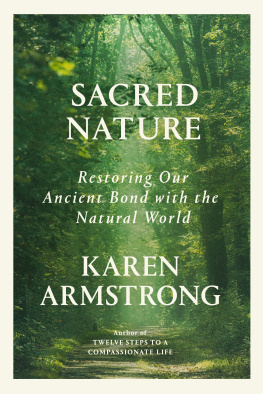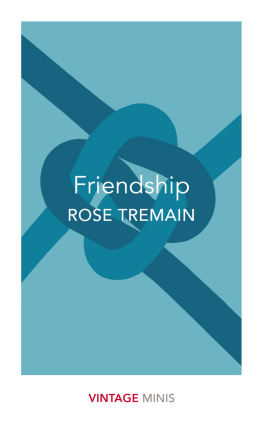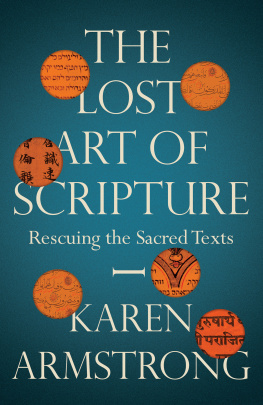
Religion
KAREN
ARMSTRONG

This ebook is copyright material and must not be copied, reproduced, transferred, distributed, leased, licensed or publicly performed or used in any way except as specifically permitted in writing by the publishers, as allowed under the terms and conditions under which it was purchased or as strictly permitted by applicable copyright law. Any unauthorized distribution or use of this text may be a direct infringement of the authors and publishers rights and those responsible may be liable in law accordingly.
VINTAGE
20 Vauxhall Bridge Road,
London SW1V 2SA
Vintage is part of the Penguin Random House group of companies whose addresses can be found at global.penguinrandomhouse.com.

Extracts from The Case for God copyright Karen Armstrong 2009; Fields of Blood copyright Karen Armstrong 2014; The Lost Art of Scripture copyright Karen Armstrong 2019
Karen Armstrong has asserted her right to be identified as the author of this Work in accordance with the Copyright, Designs and Patents Act 1988
The Case for God first published in Great Britain by The Bodley Head in 2009
First published in Vintage in 2010
Fields of Blood first published in Great Britain by The Bodley Head in 2014
First published in Vintage in 2015
The Lost Art of Scripture first published in Great Britain by The Bodley Head in 2019
This short edition published by Vintage in 2019
penguin.co.uk/vintage
A CIP catalogue record for this book is available from the British Library
ISBN 9781473570900
What is Religion?
W E ARE TALKING far too much about God these days and what we say is often facile. In our democratic society, we think that the concept of God should be easy and that religion ought to be readily accessible to anybody. That book was really hard! readers have told me reproachfully, shaking their heads in faint reproof. Of course it was! I want to reply. It was about God. But many find this puzzling. Surely everybody knows what God is: the Supreme Being, a divine Personality, who created the world and everything in it. They look perplexed if you point out that it is inaccurate to call God the Supreme Being because God is not a being at all, and that we really dont know what we mean when we say that he is good, wise or intelligent. People of faith know in theory that God is utterly transcendent, but they seem sometimes to assume that they know exactly who he is and what he thinks, loves and expects. We tend to tame and domesticate Gods otherness. We regularly ask God to bless our nation, save our queen, cure our sickness or give us a fine day for the picnic. We remind God that he has created the world and that we are miserable sinners, as though this may have slipped his mind. Politicians quote God to justify their policies; teachers use him to keep order in the classroom; and terrorists commit atrocities in his name. We beg God to support our side in an election or a war, even though our opponents are, presumably, also Gods children and the object of his love and care.
There is also a tendency to assume that, even though we now live in a totally transformed world and have an entirely different world-view, people have always thought about God in exactly the same way as we do today. But despite our scientific and technological brilliance, our religious thinking is sometimes remarkably undeveloped, even primitive. In some ways the modern God resembles the High God of remote antiquity, a theology that was unanimously either jettisoned or radically reinterpreted because it was found to be inept. Many people in the pre-modern world knew that it was very difficult indeed to speak about God.
Theology is, of course, a very wordy discipline. People have written reams and talked unstoppably about God. But some of the greatest Jewish, Christian and Muslim theologians made it clear that while it was important to put our ideas about the divine into words, these doctrines were man-made and, therefore, were bound to be inadequate. They devised spiritual exercises that deliberately subverted normal patterns of thought and speech to help the faithful understand that the words we use to describe mundane things were simply not suitable for God. He was not good, divine, powerful or intelligent in any way that we could understand. We could not even say that God existed, because our concept of existence was too limited. Some of the sages preferred to say that God was Nothing because God was not another being. You certainly could not read your scriptures literally, as if they referred to divine facts. To these theologians some of our modern ideas about God would have seemed idolatrous.
It was not just a few radical theologians who took this line. Symbolism came more naturally to people in the pre-modern world than it does to us today. In medieval Europe, for example, Christians were taught to see the Mass as a symbolic re-enactment of Jesus life, death and resurrection. The fact that they could not follow the Latin added to its mystique. Much of the Mass was recited by the priest in an undertone and the solemn silence and liturgical drama, with its music and stylised gestures, put the congregation into a mental space that was separate from ordinary life. Today many are able to own a copy of the Bible or the Quran and have the literacy to read them, but in the past most people had an entirely different relationship with their scriptures. They listened to them, recited piecemeal, often in a foreign language and always in a heightened liturgical context. Preachers instructed them not to understand these texts in a purely literal way and suggested figurative interpretations. In the mystery plays performed annually on the feast of Corpus Christi, medievals felt free to change the biblical stories, add new characters and transpose them into a contemporary setting. These tales were not historical in our sense, because they were more than history.
In most pre-modern cultures, there were two recognised ways of thinking, speaking and acquiring knowledge. The Greeks called them mythos and logos. Both were essential and neither was considered superior to the other; they were not in conflict but complementary. Each had its own sphere of competence and it was considered unwise to mix the two. Logos (reason) was the pragmatic mode of thought that enabled people to function effectively in the world. It had, therefore, to correspond accurately to external reality. People have always needed logos to make an efficient weapon, organise their societies or plan an expedition. Logos was forward-looking, continually on the lookout for new ways of controlling the environment, improving old insights or inventing something fresh. Logos was essential to the survival of our species. But it had its limitations: it could not assuage human grief or find ultimate meaning in lifes struggles. For that, people turned to mythos or myth.
Today we live in a society of scientific logos and myth has fallen into disrepute. In popular parlance, a myth is something that is not true. But in the past, myth was not self-indulgent fantasy; rather, like logos, it helped people to live creatively in our confusing world, though in a different way. Myths may have told stories about the gods, but they were really focused on the more elusive, puzzling and tragic aspects of the human predicament that lay outside the remit of
Next page
